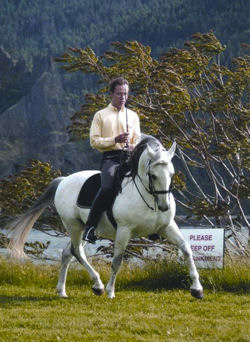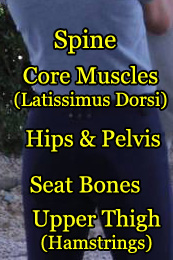Selecting a Dressage Horse – Part 1 Food For Thought
 Choosing a dressage horse can be a difficult task. Horses can be an expensive proposition. With so many horses to choose from, the task of selecting the “right horse for the job” can be daunting. Hopefully this article will eliminate some of the challenges of buying or leasing a horse. It also sheds a little light on why some horses are better for dressage than others.
Choosing a dressage horse can be a difficult task. Horses can be an expensive proposition. With so many horses to choose from, the task of selecting the “right horse for the job” can be daunting. Hopefully this article will eliminate some of the challenges of buying or leasing a horse. It also sheds a little light on why some horses are better for dressage than others.
Let’s start at the beginning. Before you can determine what type of horse you should buy, you must first evaluate your own expectations:
Why are you interested in studying dressage?
Are you looking to buy or lease a horse?
Do you have room to keep a horse?
Can you afford the expense of feeding and caring for a horse? It can cost an average of $3000 – $5000/year to keep a horse, depending on your location.
How far do you want to advance?
Do you want to show your horse?
How long would you like to ride this horse?
Are you willing to sell this horse if you surpass his ability?
Do you have the ability to train, or have a trainer available to assist with this horse?
Dressage and Horses
Dressage can benefit any rider, regardless of your current riding ability or riding discipline. It can also be beneficial to any horse because dressage teaches a horse suppleness, relaxation and self-carriage. The questions you answered above are important because not all horses and riders are capable of the skills necessary for the higher levels of dressage. By knowing your own expectations, you can determine what type of horse will work best to accomplish your goals. Knowing what your goals are and evaluating your horse’s strengths and weaknesses will help determine if prospective mounts are suitable for achieving your goals. It may be necessary at some point for you to work with a mount more suitable for your needs. This does not, however, mean that the horses you are currently looking at are incapable of learning basic Dressage.
 Your Dressage Horse’s Past
Your Dressage Horse’s Past
Another key factor in your decision should be to consider how the horse is currently schooled. Has or is the horse currently schooled in dressage. Depending upon your training ability and skill level, you may want to look for a horse that is already familiar with the levels that you are interested in riding. This is especially important for the novice rider. Despite the common inclination to “learn together.” It is far better, in most cases, for either the horse or the rider to have a strong foundation in the riding discipline that you are studying. A “green” horse and “green” rider can create a lot of frustration, leading to an overall dissatisfaction with the riding experience. This is because the learning curve for riding, especially dressage, is extremely large. The rider must be secure in his aids if he wants to teach his horse – as much as the trained horse must be secure in his movements in order to tolerate inconsistency when the novice rider is applying his aids. If you are a novice rider, it is highly recommended that you purchase a horse that is trained to at least to the highest level that you would like to attain. This will help to ensure that you develop a strong dressage foundation before you experience the challenges of teaching a “green” horse the appropriate response to your aids. If you are an experienced dressage athlete, however, you may appreciate the precision required in teaching a young or novice horse the skills necessary to be an accomplished dressage candidate. Training a horse can also help the experienced rider to hone in on the areas where they themselves need work, as well as further developing the areas that they have “mastered.”
 In addition to the discipline in which the prospective horses currently participate, it is important to know how the horse has been trained. Some horses require a stronger seat, leg or hand aids; whereas others will balk if too much pressure is applied. It is important to know how the horse has been handled and also to know your own riding techniques. This will help you choose a horse that will react suitably when you are riding.
In addition to the discipline in which the prospective horses currently participate, it is important to know how the horse has been trained. Some horses require a stronger seat, leg or hand aids; whereas others will balk if too much pressure is applied. It is important to know how the horse has been handled and also to know your own riding techniques. This will help you choose a horse that will react suitably when you are riding.
Just as important as the prospective horse’s schooling is his temperament. As with people, horses have different personalities. It is important to locate a horse that compliments your personality. Similar to choosing a spouse, you want a horse that will work well with you. Dressage is very much a partnership between horse and rider; therefore, it is extremely important to have a horse that compliments you. A high-spirited rider may want to consider a less-spirited horse to help offset his own personality. Whereas, the extremely docile rider could consider a higher energy horse to create some flash in the arena. A horse and rider that are extremely similar in personality can result in disastrous results when adding the stresses of training or showing. The horse will feed off of the emotions of the rider; therefore, it is important to know how you and your horse will respond under different circumstances. Obviously, there are exceptions to every rule. This has merely been an observation of horse and rider combinations made by many professionals in the industry.
Your Dressage Horse’s Future

If you are an inexperienced horse person, it would be best to contact a local dressage trainer or instructor to help you in making your decision. This is especially helpful because these professionals are experts in the field and they understand the importance of a good horse and rider relationship. They often have horses for sale or lease or know many people that do. This will open options and help ensure that you choose the right horse. If they have not worked with you previously, they may ask you to come for a riding lesson so that they can evaluate your skill level and riding style to help in providing suitable options. They may also ask you to answer many of the questions discussed previously in this article to help eliminate those mounts that are not in your best interest. If you need help locating a dressage professional in your area, you can check the United States Dressage Federation’s website at www.usdf.com. This website provides listings of dressage instructors and judges that have been certified through the USDF program.
Part 2 discusses the conformation and temperament of the ideal dressage horse.
Author: Dressage Academy
You May Also Like

Rhythm – Let’s Get into the Groove Newsletter
March 28, 2018
Rejuvenate Your Dressage Horse
July 6, 2017